Chairing the Meeting
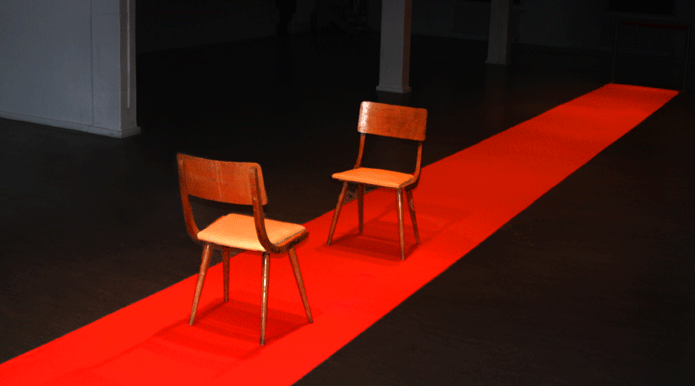
Installations and Projects
R&R
Prinz Albrecht Straße 8
Let There be Light
Big Fire
The Kindness of Strangers
Linden Hotel
Schloss Zwerg
Elsie Supreme
1+1
Finissage:
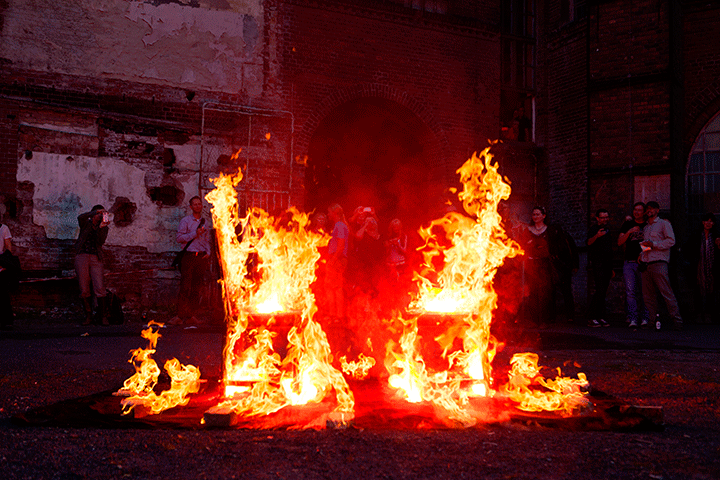
During the exhibition’s three month run, none of the former system’s perpetrators showed the courage to come forth and face a conversation with a persecuted person. For the finissage, pyrotechnician Friederike Unverzagt , with Stefan Roloff, burnt down the installation’s chairs that had been reserved for this conversation.
Zur Finissage verbrannte die Pyrotechnikerin Friederike Unverzagt mit Stefan Roloff die beiden Stühle, da kein ehemaliger Täter aus Brandenburg während der 3 Monate Ausstellungszeit den Mut aufbrachte, Roloffs Einladung zu folgen und sich darauf zu setzen, um einem ehemaligen Verfolgten öffentlich Rede und Antwort zu stehen.
Mehr Bilder der Finissage unten / More pictures of the finissage below
Zensur / Censorship:
The managing director, Jörg Heyne, tries to get the curator, Christian Kneisel, to take down one of the works.
Der Geschäftsführer, Jörg Heyne, versucht, den Kurator Christian Kneisel zum Abhängen eines der Exponate der Ausstellung zu bewegen.
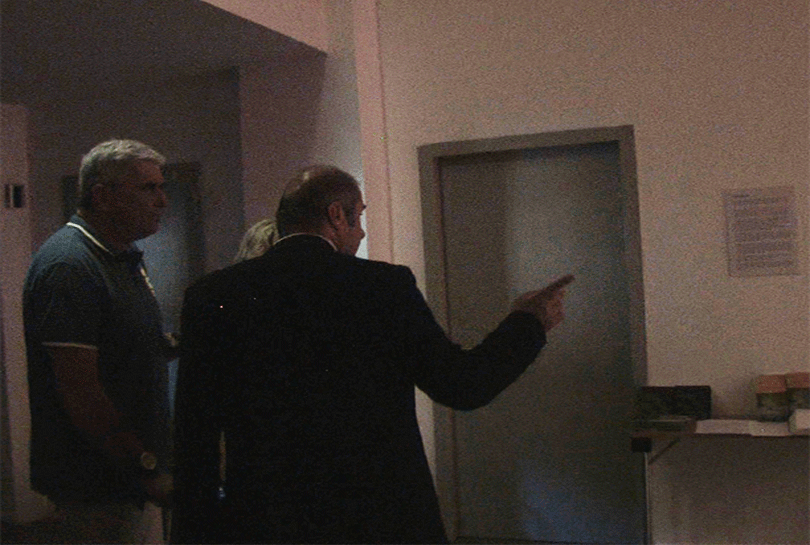
Kneisel ignores his strange request. Heyne takes down the work, violating article 5 of the consitutional law, freedom of art.
Als Kneisel nicht auf diese seltsame Forderung reagiert, nimmt Heyne das Werk selbst ab, womit er gegen Artikel 5 GG, Freiheit der Kunst verstößt.
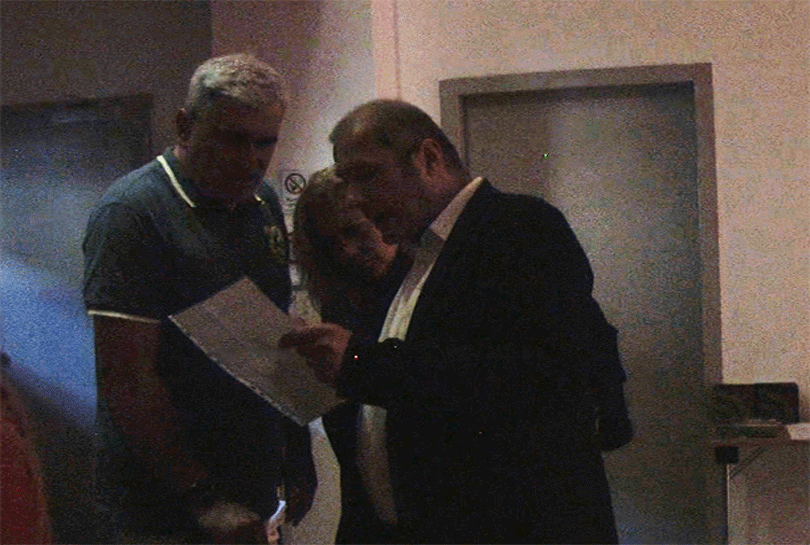
Stefan Roloff returned the work to its original place, along with a declaration about the attempted censorship (see at the bottom of this page). Heyne didn’t dare a second attempt.
Stefan Roloff hängte die Arbeit mit einer Erklärung zu Heyne’s Zensurversuch wieder an (siehe ganz unten auf dieser Seite). Heyne wagte danach keinen weiteren Versuch.
Info (for english scroll down)
Die Ausstellung lief vom 11. 7. bis zum 29. 8. 2014 in der Kunsthalle Brennabor, Brandenburg / Havel
Duration of the show: 7. 11. to 8. 29. 2014 at Kunsthalle Brennabor, Brandenburg / Havel
VERNISSAGE: AUSSTELLUNGSBESUCHER HELFEN EHEMALIGEN VERFOLGTEN BEIM HÄNGEN IHRER AKTEN:
VERNISSAGE: VISITORS HELP FORMERLY PERSECUTED STASI VICTIMS TO HANG THEIR FILES:
In seiner Multimedia-Installation lädt Stefan Roloff erfolgreiche Geschäftsleute und Politiker aus Brandenburg, die früher in der SED, bei der Stasi oder anderen Regierungsorganen der DDR tätig waren, ein, sich einem Gespräch mit Verfolgten des Systems zu stellen.
Die Länge des Raumes durchzieht – wie eine blendende Lichtlinie – ein schmaler, roter Teppich. In seiner Mitte stehen sich zwei Stühle gegenüber, die für einen solchen Dialog reserviert sind. Eine Sound Collage aus den Stimmen Verfolgter wird als atmosphärische Schleife zu hören sein. An den Wänden der Halle haben Verfolgte des DDR-Systems die Möglichkeit, Auszüge aus ihren Stasi- Akten und andere Dokumente der Repression auszustellen.
Kunst hatte in der DDR die Aufgabe, den Sozialismus zu fördern: „Literatur und Bildende Künste sind der Politik untergeordnet! … Die Idee der Kunst muss der Marschrichtung des politischen Kampfes folgen!“ (Otto Grotewohl vor dem 5. Plenum des ZK der SED, 17.3.1951). Heute folgt die Kunst oft ökonomischen Interessen, dient der Ablenkung und dem Vergessen. Roloff setzt dieser Entwicklung einen erweiterten Kunstbegriff entgegen, der Mechanismen totalitärer Entwicklungen analysiert und zur Auseinandersetzung herausfordert. Aus eigenem Erleben kennt er die Repressionspraktiken des faschistischen Franco-Regimes. Er musste miterleben, wie sein Vater, Angehöriger der Widerstandsbewegung „Rote Kapelle“, sich nach dem Krieg vergeblich dagegen auflehnte, dass frühere Anhänger des Nationalsozialismus in der alten Bundesrepublik wieder in verantwortliche Positionen kamen.
Gegenwärtig sind von Stefan Roloff zwei permanente Videoinstallationen, in der Villa Schöningen und in der Potsdamer Lindenstraße 54, zu sehen. Mit der Kuratorin Adrienne Goehler plant er 2015 ein Openair-Projekt in Berlin. Ende 2014, wird auf seine Initiative eine Dauerausstellung zur Roten Kapelle im Holocaust Memorial Museum in Washington D. C. eröffnet. Aktuell arbeitet Stefan Roloff in den USA an einem Spielfilm zu diesem Thema.
KÜNSTLERGESPRÄCH, KURATOR CHRISTIAN KNEISEL MIT STEFAN ROLOFF:
In his multimedia installation, artist Stefan Roloff invites business executives and politicians who were formerly active in the SED (the former GDR’s official party), the Stasi (secret police), and other repressive governmental agencies to a meeting with people who were persecuted by that system.
A long red carpet bisects the darkened room like a bright line of light. In the middle, two chairs face each other. They are reserved for dialogue. A sound collage made up from the voices of persecuted people is audible as a seamless atmospheric loop. On the walls of the exhibition hall, people who were persecuted by the GDR are invited to hang their Stasi files and other documents of the repression.
In the GDR, art had the function to support Socialism: „Literature and the arts are subordinated to politics! … The idea of the arts must follow the marching order of the political struggle!” (Otto Grotewohl to the Central Committee of the SED party, March 17, 1951). Today, the arts cater to economic interests, serving as distraction and for forgetting. Roloff counters this with a broader concept of art. He analyzes the mechanisms of totalitarianism and provokes debate. From his own experience having lived in Spain, he knows the repressive tactics of the Fascist Franco regime. He also had to witness how his father, a member of the resistance group, „Red Orchestra,” fought in vain the new German Federal Republic that returned old Nazis into powerful positions.
At present, two permanent video installations by Stefan Roloff can be seen in Potsdam at Villa Schöningen and at Lindenstr. 54. With curator Adrienne Goehler, he plans to install an open air project in Berlin in 2015. At the close of 2014, the Red Orchestra will be incorporated into the permanent exhibition at the Holocaust Memorial Museum in Washington DC. Parallel to that, they are preparing a feature film about this subject in the US.
Finissage:
(photos by Ed Elder):
FRIEDERIKE UNVERZAGT, STEFAN ROLOFF: VORBEREITUNG / SETTING UP
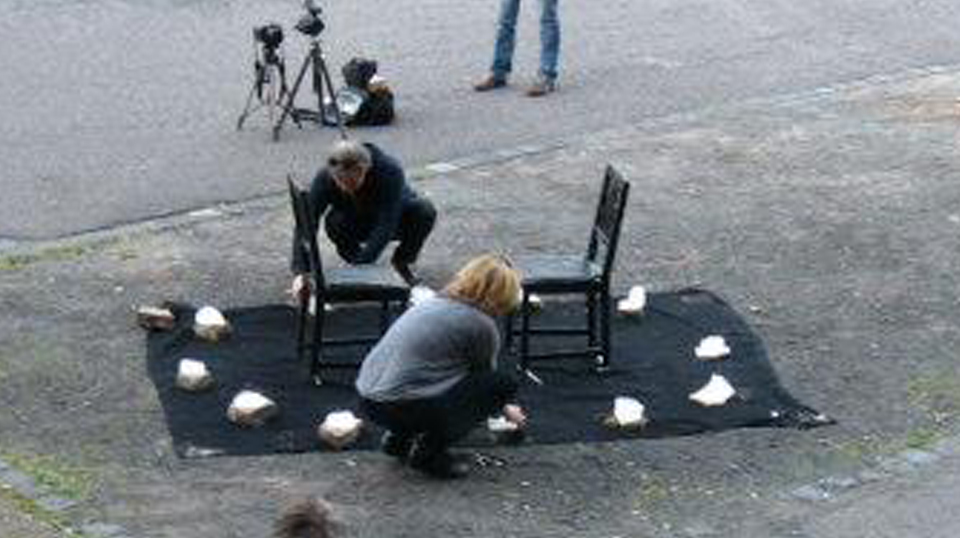
FRIEDERIKE UNVERZAGT, STEFAN ROLOFF: VORBEREITUNG / SETTING UP
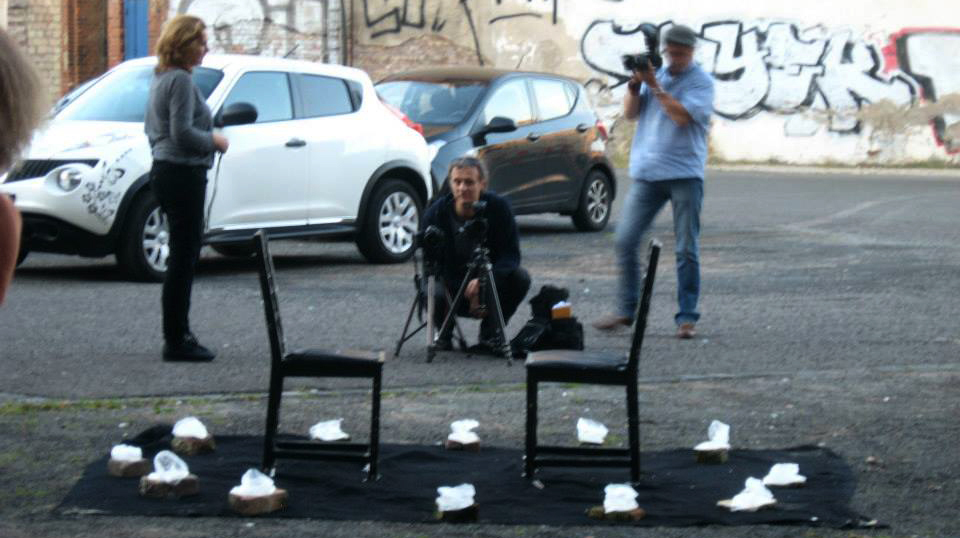
MIT ALEXANDER ARNOLD, DER IM DDR GEFÄNGNIS ZWANGSARBEIT FÜR IKEAS LEISTEN MUSSTE, NEHMEN BESUCHER SEINE AKTEN VON DEN WÄNDEN.
VISITORS HELP ALEXANDER ARNOLD WHO DID FORCED LABOR FOR IKEA IN A GDR PRISON TO TAKE DOWN HIS FILES FROM THE WALLS.
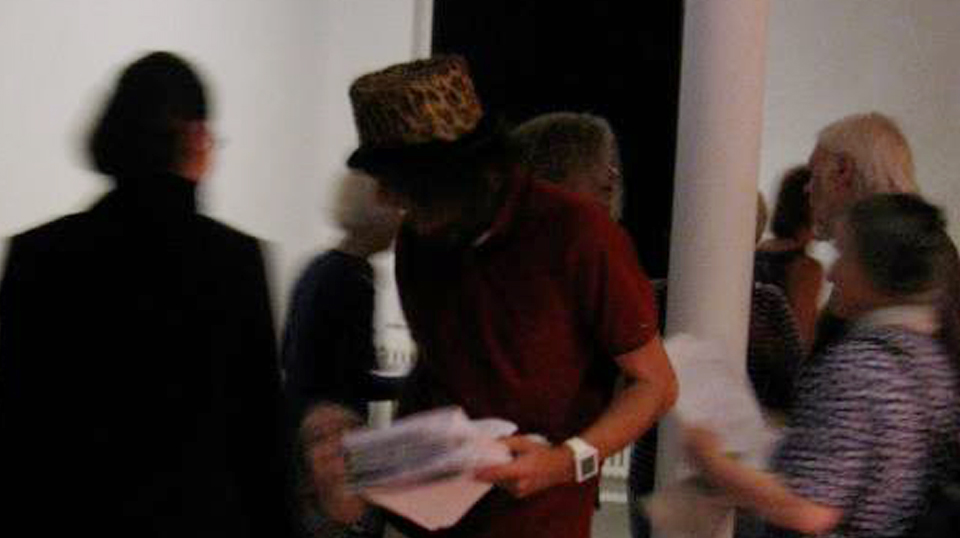
LÜÜL AND BAND
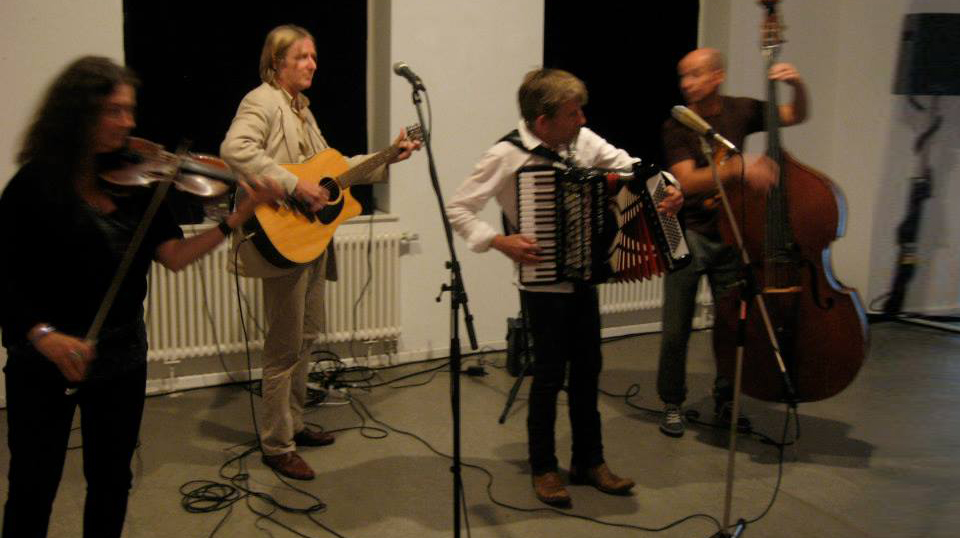
STEFAN ROLOFF ZÜNDET / STEFAN ROLOFF LIGHTS UP
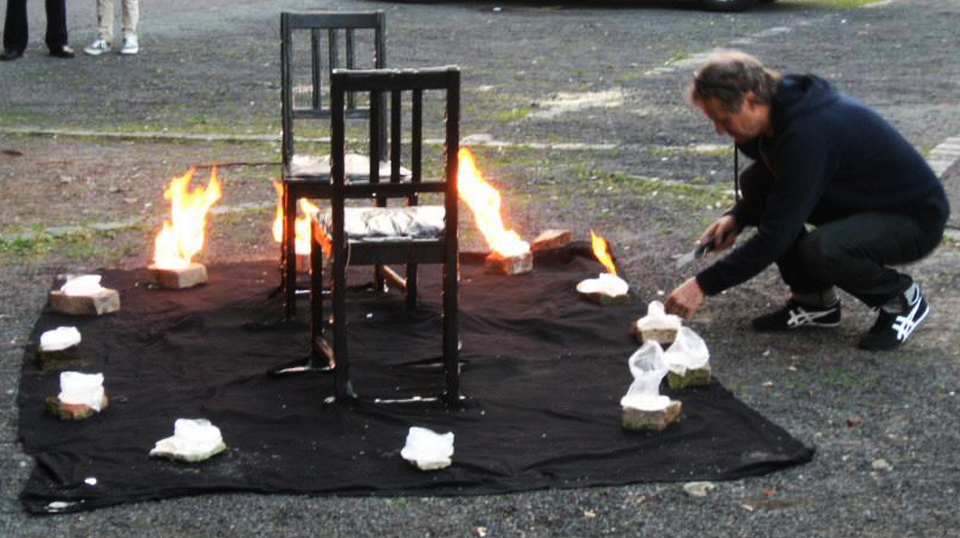
FEUER GEHT AN / FIRE STARTS
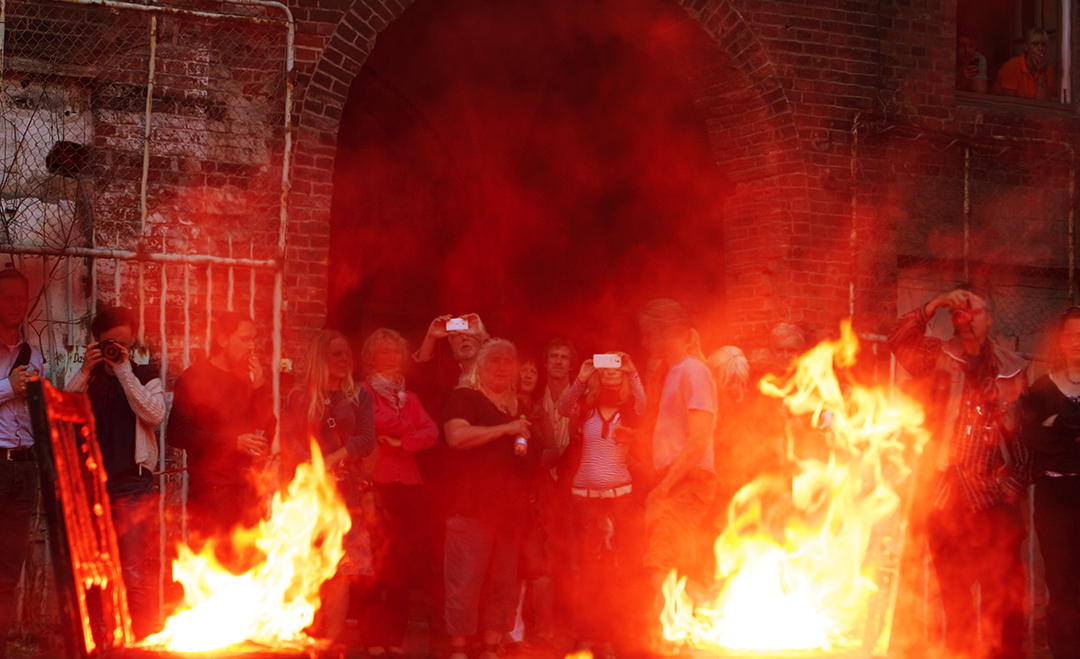
BRENNENDE STÜHLE / BURNING CHAIRS

STEFAN ROLOFF FOTOGRAFIERT NACH DEM FEUER / PHOTOGRAPHS AFTER THE FIRE
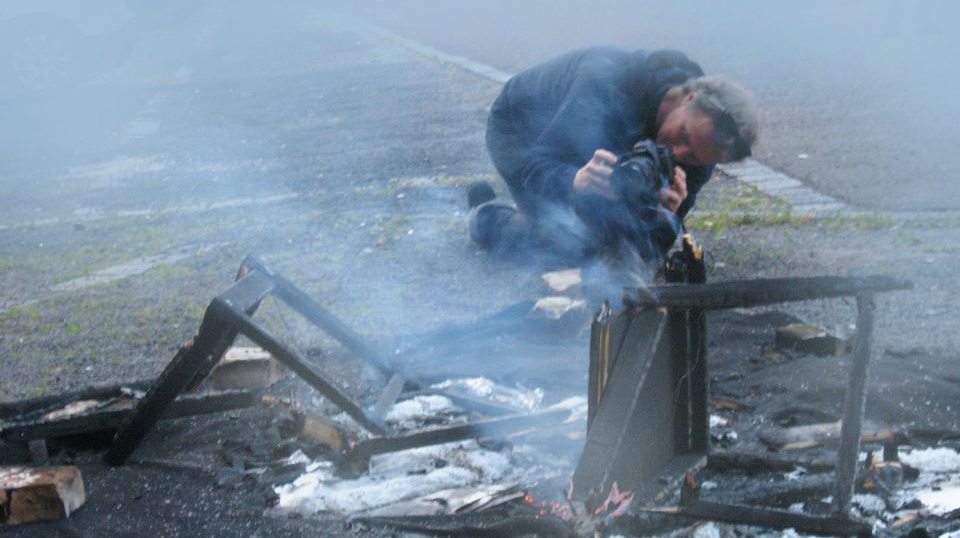
QUALMENDE RESTE / SMOLDERING REMAINS
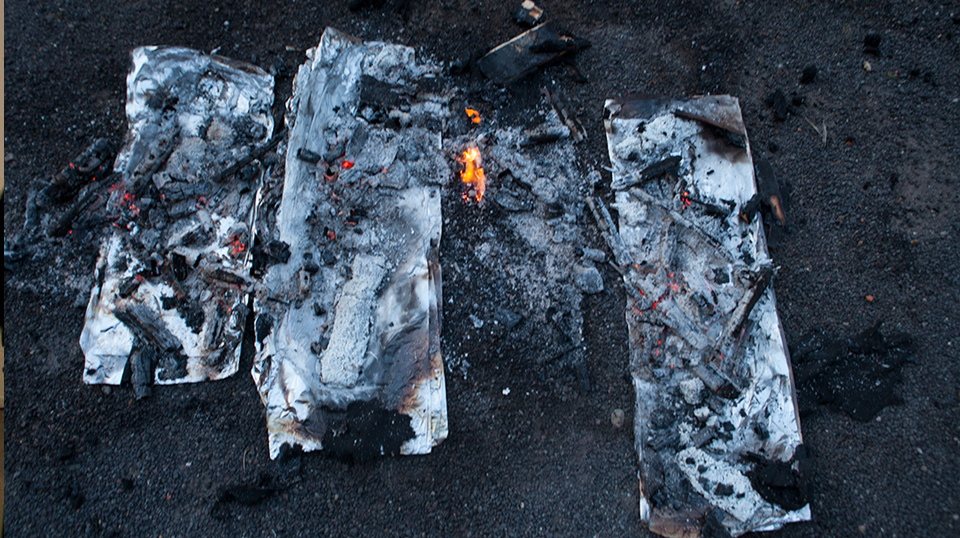
Bekanntmachung nach der Zensur:
Declaration after the Censorship:
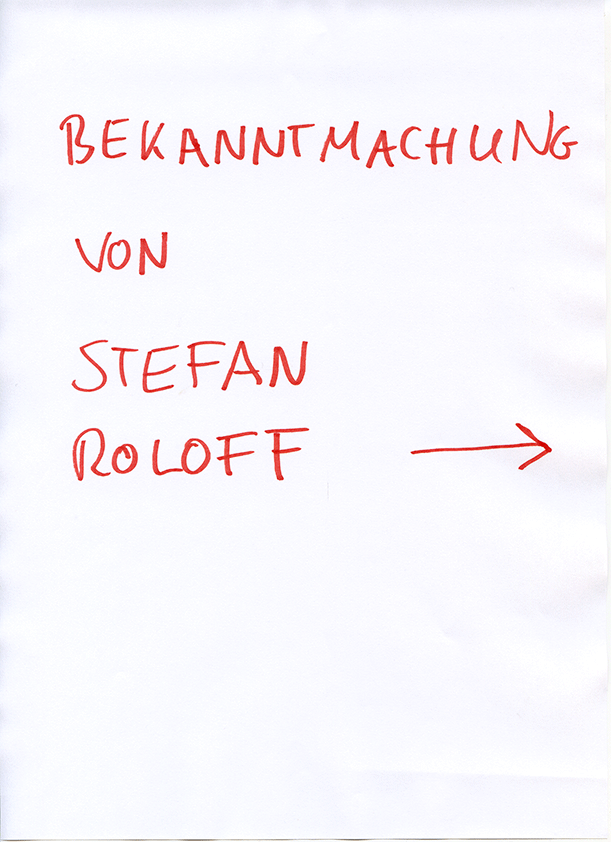
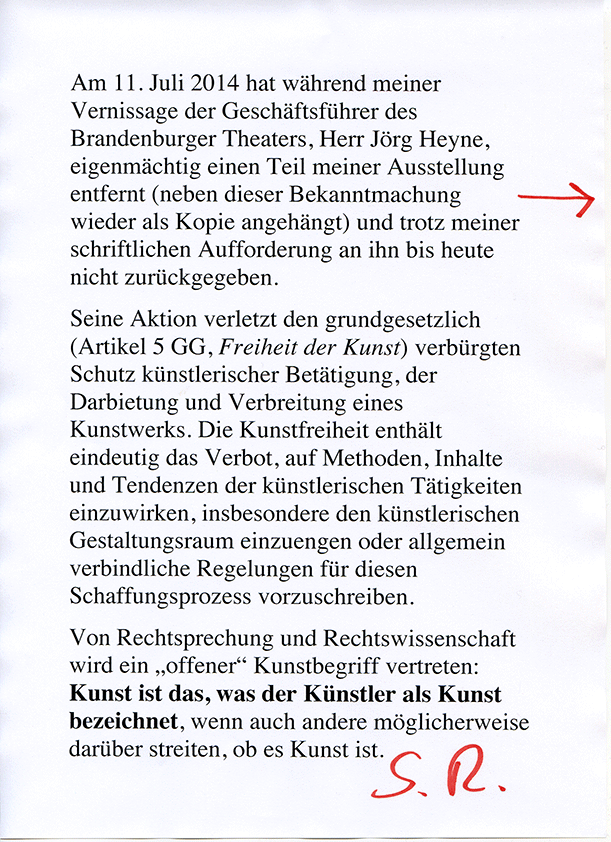
Die entfernte Arbeit:
The work that was removed:
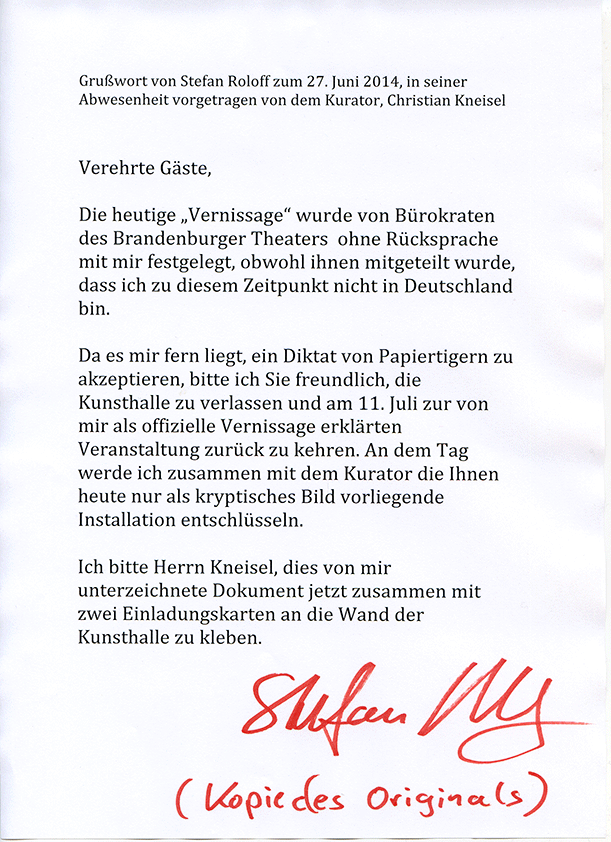
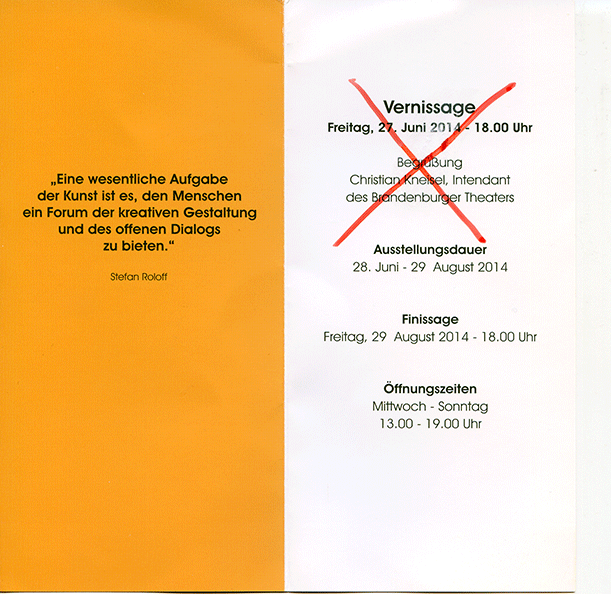
MAZ Artikel von Ann Brünink, 1. 9. 2014:

Credits
Installation:
Stefan Roloff
Kurator:
Christian Kneisel
